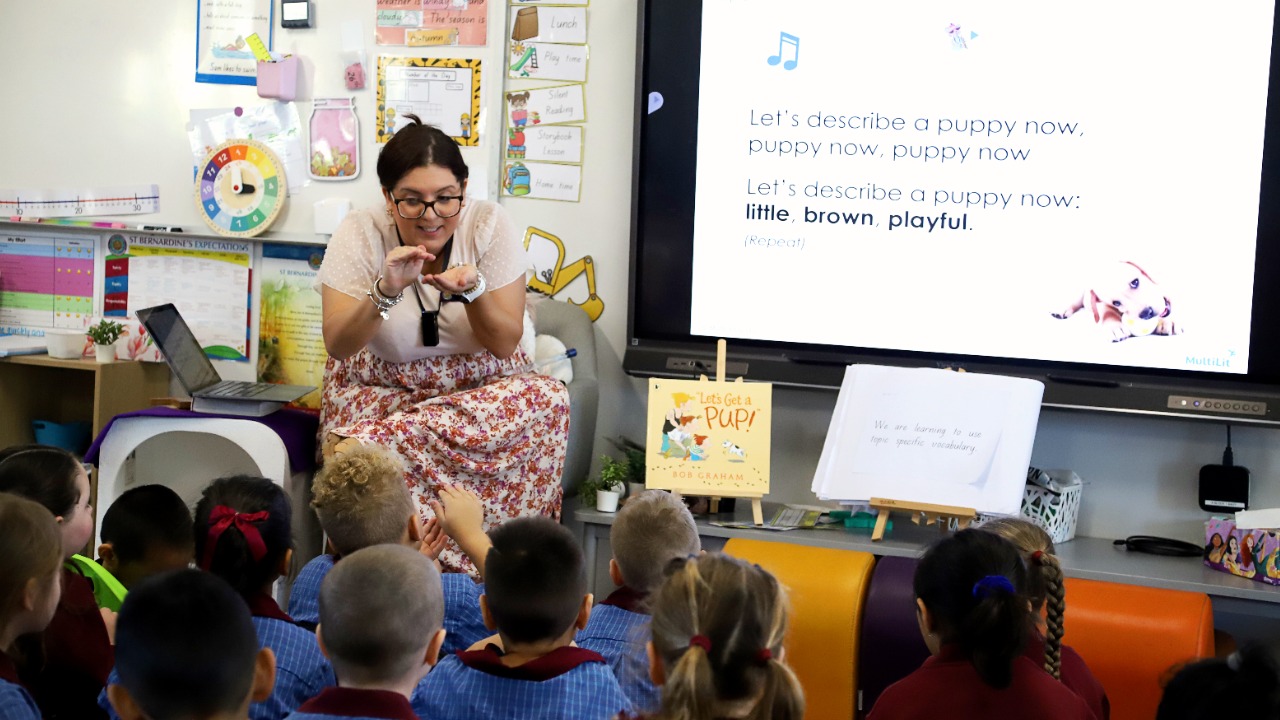The Australian Curriculum
The Australian Curriculum is the source of all Curriculum planning, Assessment and Reporting at St Bernardine's.
The Australian Curriculum sets consistent high standards for what all young Australians should learn as they progress through schooling. It prepares Australia's next generation for the future and lays the building blocks for generations to come.

© Brisbane Catholic Education, St Bernardine's School (2025)
The Australian Curriculum is carefully designed to ensure that all students are provided with the essential knowledge, skills, and understanding they need to succeed in a rapidly changing world. It sets high standards, ensuring consistency in what students are expected to learn as they progress through their schooling years. This curriculum not only prepares students for the future but also establishes the foundation for lifelong learning and active citizenship.
At St Bernardine's School, the following learning areas are taught in alignment with the Australian Curriculum:
- English
- Mathematics
- Science
- Humanities and Social Sciences
- The Arts
- Technologies
- Health and Physical Education
- Languages (Italian)
The Australian Curriculum integrates seven general capabilities that are crucial for students to thrive in the 21st century. These capabilities are woven throughout the curriculum and aim to develop students' knowledge, skills, behaviours, and dispositions. The general capabilities include Literacy, Numeracy, Information and Communication Technology (ICT) Capability, Critical and Creative Thinking, Personal and Social Capability, Ethical Understanding, Intercultural Understanding
The curriculum also addresses three key cross-curriculum priorities that are essential for contemporary education. These priorities, highlighted in the Melbourne Declaration and reaffirmed in the Alice Springs Declaration, are Aboriginal and Torres Strait Islander Histories and Cultures, Asia and Australia's Engagement with Asia and Sustainability. These priorities are embedded across various learning areas to provide students with a comprehensive and inclusive education.
Australian Curriculum
Alice Springs Declaration
Devices
Student learning is supported in Years 2 – 6 with a 1:1 device program and in Prep and Year 1 with a 1:2 device program. This enables teachers and students to integrate a range of digital tools and technologies into all areas of the Australian curriculum.
Prep - Year 2 Curriculum
At St Bernardine's, we value the development of the whole child. Our exciting Prep program ensures each child is recognised as a unique individual created by God. We endeavour to make every child feel genuinely valued and accepted, respecting each other as they play and learn together. Each child has special qualities to be encouraged and developed in a loving, caring environment.
In Prep, teachers support children's learning by making connections between school and their experiences at home, kindergarten or childcare. Research tells us that children learn best when they actively construct knowledge of their world around them. Therefore, your child will be actively involved in an inquiry-based learning program where teachers and children work together to explore, observe, ask questions, discuss observations and seek answers about everyday experiences. Your child will be developing their physical skills by climbing an obstacle course or building their literacy skills through language games.
Can my child go to Prep?
To be eligible to enrol in Prep 2026 your child must be born between 1 July 2020 and 30 June 2021. The child will need to be five by 30 June in the year they start in preparatory classes.
| Birthdate | Eligible for prep year in: | Eligible for Year 1 in: |
| Child born 1 July 2020 - 30 June 2021 | 2026 | 2027 |
| Child born 1 July 2021 - 30 June 2022 | 2027 | 2028 |
| Child born 1 July 2022 - 30 June 2023 | 2028 | 2029 |
Year 3-4 Curriculum
Learning in the Middle Years
The Middle Years Curriculum at St Bernardine's builds on the student's experiences in the Early Years. We believe in creating a learner-centred curriculum where we aim to cater for the unique developmental needs and interests of the students. Teachers work together to provide a consistent approach to the Curriculum, consistent literacy routines and ensure a common language of learning in the classroom.
PHOTO
We know that children in the Middle Years learn best when they:
- make connections between their diverse prior experiences and learning at the school
- participate in making decisions
- make choices and contribute to learning experiences
- share their opinions and diverse experiences
- discuss their learning
- learn in a responsive and supportive social environment
We support students in the Middle Years to develop the 21st Century Learning Skills of creativity and innovation; critical thinking; decision-making; collaboration and communication; ICT literacy and personal and social responsibility through educational experiences that combine digital, face-to-face and hands on learning.
Year 5-6 Curriculum
We follow an inquiry-based style of teaching and learning, where the students are encouraged to be confident, self-directed learners. Much emphasis is placed on effective collaboration and the students work with students across the year level with a variety of classroom and specialist teachers.
We believe students in years 5 and 6 learn best when they;
- take risks and ask questions
- collaborate and communicate
- persist with complex problems to challenge themselves
- reflect on their learning
- seek and apply feedback
- can display their individual creativity
- make connections to the real world
Subjects taught by classroom teachers
- Religion
- English
- Mathematics
- Science
- Humanities and Social Sciences
- Health
- Visual Arts
Subjects taught by specialist teachers
- Physical Education
- Drama
- Music
- Media Arts
- Technologies
- Italian